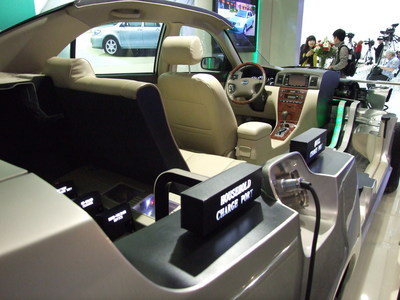University of Michigan will help drive clean energy partnerships between U.S., China, experts say
Cooperation between researchers in the United States and China is critical to developing revolutionary clean tech solutions, and the University of Michigan will play a central role in that emerging partnership, alternative energy proponents said today at a conference in Ann Arbor.
Both countries will benefit from a push for more joint energy research and cooperation with industrial partners, the proponents said at the Michigan-China Clean Tech Symposium.
“Cooperation and competition are both essential parts of what is happening,” said Terry Cooke, founder of GC3 Strategy and a public policy fellow at the Woodrow Wilson International Center for Scholars. “We are joined at the hip in solving this challenge.”
The conference comes as U-M is positioning itself as a catalyst for cooperation between the U.S. and China on clean energy research. The university is leading an electric vehicle partnership on behalf of the U.S.-China Clean Energy Research Center.
U-M announced in September that it had landed a $12.5 million grant to lead a five-year consortium to develop electric vehicle technologies -- an initiative backed by the Obama administration.
Marvin Parnes, U-M’s associate vice president for research, said the university believes clean energy partnerships with Chinese researchers are vital.
“I think we really bring a lot of knowledge and energy to the discussion,” Parnes said.
At U-M, clean energy innovation has surged over the last decade. The U-M Tech Transfer Office reports 213 “invention disclosures” in its portfolio of faculty innovation, including 55 that are licensed to existing companies and 70 that are being actively marketed.

A display by Chinese automaker BYD shows the insides of an electric vehicle at the 2010 North American International Auto Show.
Nathan Bomey | AnnArbor.com
Fueled by a surge in federal funding and private partnerships, U-M has boosted its clean energy research activity and created a few alternative energy startup companies, including Ann Arbor-based battery firm Sakti3 and Ann Arbor-based Vortex Hydro Energy.
John Austin, director of Great Lakes Economic Initiative for the Brookings Institution, said research universities like U-M are the “great horsepower” of innovation and should play a role in clean energy partnerships with China.
Critics say that partnerships with Chinese researchers expose U.S.-funded intellectual property to misuse or theft.
U-M has offered its reassurance that its intellectual property won’t be handed away to Chinese researchers as a result of its various research partnerships.
China is expected to identify various energy and environmental issues as priorities when it unveils its 12th five-year plan to guide the country’s continued growth, said Kenneth DeWoskin, senior advisor and director of Deloitte’s China Research and Insight Center.
Those priorities are likely to include clean energy technologies, “new energy vehicles” and environmental preservation, DeWoskin said.
By all accounts, China’s solar panel manufacturing sector and wind turbine makers have enjoyed the benefits of aggressive government subsidies over the last several years.
However, DeWoskin said those industries today are enduring “an awful lot of economic stress.”
In the emerging electric vehicle sector, China hopes to beat U.S. carmakers by developing batteries and alternative propulsion systems faster and cheaper.
But hurdles remain. Chinese electric vehicle maker BYD, for example, initially claimed that it would be exporting electric vehicles to the U.S. by spring 2010 - but that hasn’t happened.
Still, “new energy automotive will be among the most important sectors in the (Chinese) economy,” DeWoskin said.
Contact AnnArbor.com's Nathan Bomey at (734) 623-2587 or nathanbomey@annarbor.com. You can also follow him on Twitter or subscribe to AnnArbor.com's newsletters.


Comments
David Briegel
Sun, Dec 12, 2010 : 5:44 p.m.
They won the cold war. To the victor go the spoils. They won Ronnie's Cold War. "Cooperation and competition" "Joined at the hip". Hah! You guys said free trade was a great thing. You rejected our pleas for fair trade. Let the corporations rule. So we get our "values" reflected back to us. Child labor, slave labor, prison labor, plundering the natural resources and polluting the environment. They ship defective and poisoned products to us. Cheap. Or not so cheap. And you want to call it "cheap manufacturing" instead of what it really is. You describe it!
braggslaw
Sat, Dec 11, 2010 : 7:18 p.m.
Please, the only reason why Chinese companies partner with the west is to steal... period. They bring nothing to the table. The partnership is a wealth transfer of knowledge in one direction... to China from UM. The USSR regrets having partnered with China in defense technology. The Japanese, Germans and French regret their bullet train partnership with the Chinese. Were are only five years away from China exporting cars to North America that were designed and financed by the USA.
trespass
Sat, Dec 11, 2010 : 4:48 a.m.
I think we really bring a lot of knowledge and energy to the discussion, Parnes said. What will China bring to the discussion? Cheap labor and little regard for patents or WTO trade rules. How many patent worthy innovations has China put forth during our many joint research agreements with them? Look at wind turbines. Here we are inventing technology and claiming that Michigan is the natural home for manufacturing but our government is proposing to give a Chinese start up company $450 million in "stimulus money" to build turbines for a proposed wind farm in west Texas. The joint agreement on electric vehicle technology is a big mistake. Their weakest point is research and innovation and their strong point is cheap manufacturing. Why then should we help them with our research so they can compete with American manufacturers.
Top Cat
Fri, Dec 10, 2010 : 3:22 p.m.
"U-M has offered its reassurance that its intellectual property wont be handed away to Chinese researchers as a result of its various research partnerships." And if you believe that, I have a bridge in Brooklyn that is for sale.